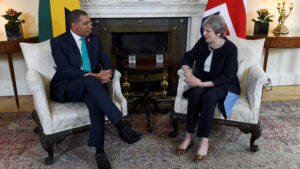 Theresa May has apologised to the 12 Caribbean heads of government for the treatment of Windrush citizens and promised that no one would be deported.
Theresa May has apologised to the 12 Caribbean heads of government for the treatment of Windrush citizens and promised that no one would be deported.
The prime minister told a meeting with Caribbean leaders she wanted to dispel any impression that her government was “in some sense clamping down on Commonwealth citizens, particularly those from the Caribbean”.
“I take this issue very seriously. The home secretary apologised in the House of Commons yesterday for any anxiety caused. And I want to apologise to you today. Because we are genuinely sorry for any anxiety that has been caused,” she said.
May added: “Those who arrived from the Caribbean before 1973 and lived here permanently without significant periods of time away in the last 30 years have the right to remain in the UK, as do the vast majority of long-term residents who arrived later. I don’t want anybody to be in any doubt about their right to remain here in the United Kingdom.”
She pledged to compensate anyone left out of pocket after it emerged that some people had lost their jobs and benefit entitlements, and others had had to take specialist legal advice to avoid deportation.
She added: “We would also like to reassure you that there will be no removals or detention as part of any assistance to help these citizens get their proper documentation in place.”
After the meeting, the Jamaican prime minister, Andrew Holness, said he accepted May’s apology, stating: “I believe that the right thing is being done at this time.”
Asked if he was satisfied that nobody had been deported as a result of UK paperwork issues, Holness said: “I asked the direct question of the prime minister. She was not able to say definitively that that was not the case.
“But, they are assuring us that they are checking the records that they have to make sure that that is not the case. If persons were deported, they have told us that they have established a hotline … and they are encouraging persons who may fit that category to call it.”
No 10 had initially refused to meet the leaders but a furore over the treatment of the affected people, who predominantly arrived in the UK as children from the Caribbean, led the home secretary, Amber Rudd, to apologise to the Commons on Monday.
Speaking earlier in the day, the Cabinet Office minister, David Lidington, blamed officials for May’s original refusal to meet the Caribbean leaders.
“As soon as this issue was brought personally to the attention of the prime minister yesterday, she countermanded the decision of people in her office and agreed to the meeting,” he told BBC Radio 4’s Today programme.
Lidington also said the government was still not certain whether any Windrush-era citizens in the UK had been wrongly deported, reiterating that their treatment “had gone badly wrong”.
Windrush arrivals embark on a new life in UK – archive photos
“I talked to the home secretary about this last night, and the position is that we have no information. We do not know of any cases where somebody who has been deported is in this category,” Lidington said.
“The home secretary, to double-check this, has asked her officials to work through the records methodically, just to check whether anything has gone appallingly wrong in that way, and then we can put it right.”
The shadow home secretary, Diane Abbott, later tweeted: “It’s unacceptable for ministers to claim they don’t know how many Windrush citizens have been deported. A simple matter of checking Home Office records, surely?”
Amber Rudd delivered an unprecedented apology in the Commons on Monday for the “appalling” actions of her department.
Windrush U-turn is welcome, but May’s policy was just cruel
Read more
The home secretary announced the creation of a new Home Office team, staffed by 20 officials, dedicated to ensuring that Commonwealth-born long-term UK residents would no longer find themselves classified as being in the UK illegally. She also promised that cases would be resolved within two weeks and application fees would be waived.
Lidington denied that the “hostile environment” approach to immigration enforcement put in place by May when she was home secretary had helped trigger the problem, insisting it was the result of decisions made over decades.
“It was clearly right that the home secretary recognised that things had gone badly wrong in respect of this group of people and made a full formal apology to parliament and the public about this yesterday,” he said.
The Guardian has been documenting a growing scandal over the past five months affecting an unknown number of people who arrived in the UK from the Caribbean as children, often on parents’ or siblings’ passports, but were never formally naturalised or hadn’t applied for a British passport. The British government had invited people from the region to work in the UK after the second world war.
